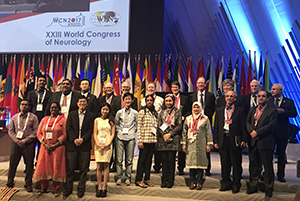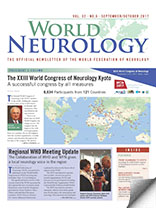By Wolfgang Grisold and
Steven L. Lewis, Editor

Participants in the Tournament of the Minds gather for a photo at the completion of the tournament in Kyoto, Japan, at the XXIII World Congress of Neurology. See more photos from the World Congress of Neurology.
The XXIII Congress of the World Federation of Neurology took place Sept. 16-21, 2017, in Kyoto, Japan.
The congress was successfully organized in cooperation with the Japanese Society of Neurology. Preparation over the past several years led to this impressive achievement. More than 8,600 participants visited the congress, which is the highest number of attendees at any World Congress of Neurology (WCN). This reflects the high interest in the brand of WFN World Congresses as well as the high global interest in neurology.
The motto of the congress was “Defining the Future of Neurology.” In doing so, the World Federation of Neurology (WFN) provided scientific input from the World Health Organization (WHO), the Global Neurology Network, and the six WFN regions.
The opening ceremony of the WCN was remarkable as the Crown Prince and his wife hosted a small meeting with the representatives of the WFN and the Japanese Society of Neurology and then gave a nice welcome and introduction at the opening. The WFN is honored that this prestigious visit was possible, which underlines the importance of the WFN and its global activities.
Scientifically, Nobel laureate Edvard Moser spoke on grid cells and the medial-entorhinal space networks. Two additional Nobel laureates presented. Susumu Tonegawa explored monitoring and engineering memory engram cells and their circuits, and Shinya Yamanaka spoke on recent progress in induced plutipotent stem cell research and applications. The WFN medal for Services to International Neurology was presented to Jun Kimura, the WFN Medal for Scientific Achievement in Neurology was presented to Angela Vincent, and the WFN Lifetime Achievement Award was presented to Chandrashekhar Meshram.
As in previous congresses, the scientific program was intertwined with teaching courses. For the first time, access to all teaching courses was free, and many teaching courses were packed full with interested attendees. Also for the first time, the World Congress included midday sessions where Japanese attendees participated in large and highly attended sessions in their native language, a novelty for WFN congresses.
There were other interesting aspects to the program besides the scientific highlights. For example, Tarun Dua presented the new Atlas of Neurology, which was released during the World Congress. This second edition of the atlas, which was created jointly with the WFN, highlights the worldwide distribution of neurologic services and neurologic possibilities. It will serve as a basis for many health politicians in regard to neurologic services. Also timely, Valery Feigin’s presentation on global neurology health statistic clearly showed the importance of neurologic diseases worldwide and demonstrated that neurology is the second-most frequent cause of death and the most frequent for disability in the world. These statistical analyses will influence many aspects of health policies worldwide.
These are just some examples of the many scientific presentations, reports and educational activities that occurred throughout this remarkable and highly attended conference, all with the goal to positively impact neurologic patient care.
From an organizational standpoint, the World Congress of Neurology also is the time when all the bodies of the WFN, including the committees and research groups, meet. The productive educational endeavors by the WFN, including the spreading of its educational activities in Africa, South America, and, hopefully soon, in Asia were acknowledged and approved by all committees. In addition, the World Congress included the important activity of a Patient Day, an activity that was first introduced at the WCN Vienna, and included the presence of President Prof. Raad Shakir. This patient day gave a strong signal that patients are important for the structure and development of the WFN.
The Council of Delegates meeting was held as the formal meeting of the delegates of the World Federation and several elections were made.
For the position of the new president of the WFN, Professor William M. Carroll from Australia was elected; for vice president, Professor Ryuji Kaji from Japan was elected; and for the open trustee position, Dr. Riadh Gouider was elected for a second term. After the next World Congress in Dubai in 2019, the next congress site will be in Europe and there was strong competition between four cities: Copenhagen, London, Marseille, and Rome. The Council of Delegates voted Rome to the be the site for the World Congress of Neurology in 2021.
In addition to the scientific and educational program, the Japanese organizers did a tremendous job accommodating their guests in a beautiful congress center. There was time for interaction and the beautiful gardens surrounding this unique place were also appreciated by all of the attendees.
The social program was wonderfully organized and beautiful events gave time and opportunity to observe and participate in the remarkable local culture as well as network and connect with colleagues from all over the world.
The closing ceremony was a beautiful event as the culmination of a tremendously successful congress in Kyoto. Included in the closing event were presentations to the recipients of the Elsevier Prize for Best Clinical Paper (awarded to Sharon Savage from the United Kingdom, for her and her colleagues’ report on the Long-Term Prognosis of Transient Epileptic Amnesia: Evidence from the TIME Project) and for Best Research Paper (awarded to Gen Shiihashi, Japan, for his and his colleagues’ report, A Novel ALS/FTD Model Mouse Expressing Cytoplasmic Mutant FUS Leads Neurodegeneration via Dendritic Homeostasis Disruption). The Ted Munsat award, a new WFN award for educational contributions to the WFN, was awarded to Walter Struhal and Tissa Wijeratne. Closing remarks were made from many dignitaries, including President Shakir and incoming President Bill Carroll, and Congress President Hidehiro Mizusawa, and culminated in the ceremonial exchange of gifts between Prof. Mizusawa and Suhail Al Rukn, the congress president for the next World Congress to be held in Dubai.
We hope you all enjoy the accompanying photographs as just some examples of many of the wonderful memories from the XXIII World Congress of Neurology in Kyoto. All readers are also encouraged to go to the WFN website for links to videos from many of the plenary lectures from WCN XXIII.
See more photos from the World Congress of Neurology.
